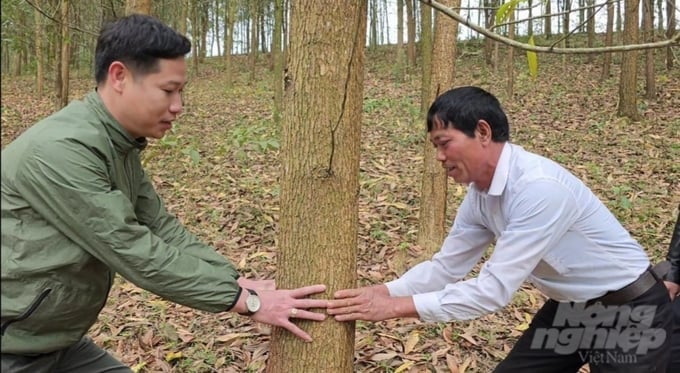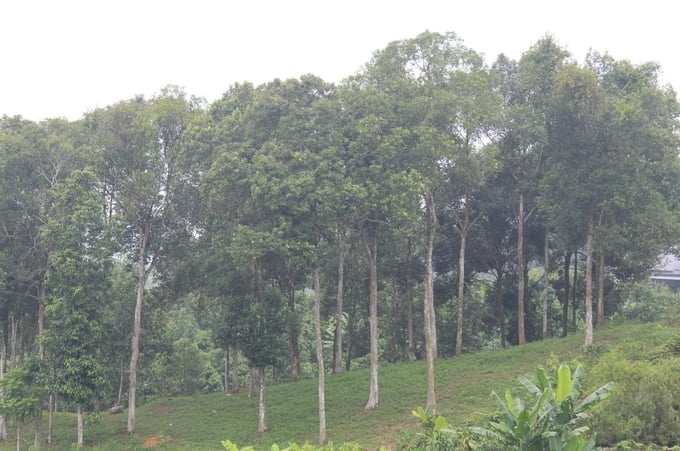May 20, 2025 | 20:00 GMT +7
May 20, 2025 | 20:00 GMT +7
Hotline: 0913.378.918
May 20, 2025 | 20:00 GMT +7
Hotline: 0913.378.918
What is FSC forest certification?
FSC stands for Forest Stewardship Council, a non-profit, non-governmental organization established in 1993, often referred to as the Forest Management Council.

Forest plantation following FSC standards helps many farmers in Thach Thanh district, Thanh Hoa province, achieve high incomes. Photo: Quoc Toan.
The Forest Stewardship Council (FSC) is the sole global organization recognized for developing forest certification standards, established to maintain and ensure responsible forest management systems. Its purpose is to minimize deforestation and uncontrolled logging, leading to a reduction in forest area, which serves as Earth's green lungs.
After over 30 years of operation, FSC has demonstrated its global influence in preventing illegal logging and severe forest destruction. Currently, FSC forest certifications are present in over 50 countries and territories, with more than 850 members, including non-governmental organizations, scientific research centres, international certification bodies, community development centres, and businesses.
According to experts, there are three types of FSC forest certifications: First is the Forest Management Certificate (FMC) ensures forest protection rights, granted to national forest areas meeting environmental, social, and economic standards. This certificate is specifically for loggers and forest supervisors, verifying compliance with FSC's 10 principles, and aligning with environmental, forestry, and social criteria.
Second is the FSC Chain of Custody Certificate (CoC) certifies the product journey from forest-originated raw materials processing, transportation, and production, to distribution to consumers. This certificate confirms wood-based product origins, meeting FSC's criteria.
Third is the FSC Chain of Custody/Control Wood Certificate (CoC/CW) assesses wood source control for forest management, production, processing, and trading entities according to FSC's control standards.
Certified products are managed consistently through FSC's chain-of-custody data system, identified by specific logos and trademarks.
Experts note that as of now, there have been no changes in FSC or new certifications. However, regulatory revisions occur approximately every three years, necessitating transitions.
FSC's vision is set every five years with the meeting, with the latest vision covering 2021-2026, but no new certification content has been observed.
In Vietnam, as of March 2023, 1,311 FSC CoC certificates have been issued to businesses, and 60 FSC FMC certificates have been granted to forest areas, covering a total area of 251,477 thousand ha with certification.
Why is forest plantation required to be FSC certified?

Forest plantations with FSC certification produce various products, from paper to furniture, aiming to provide consumers with responsible choices, only using products knowing they're not from deforestation. Therefore, to sustain export markets, forestry enterprises and cooperatives must have clear wood sourcing to gain competitive advantages. Photo: Thanh Tien.
According to expert Nguyen Van Chung (Vietnamese Quality Consultancy and Training Company - providing technical consultancy to facilitate import-export and trading of forest-originated goods complying with FSC regulations):
The benefits of FSC-certified forest products include: Economically, FSC certification reduces waste from forest resources. Accordingly, FSC-labeled forest products have higher economic value, enhancing product and brand value.
According to statistics from this organization, FSC-certified forest products typically have a higher economic value of 20-30% compared to similar products.
Regarding branding: Individuals, businesses, cooperatives, or forest planting organizations are elevated with FSC certification. Additionally, manufacturing business units can use FSC certification to promote their products.
Regarding the environment: FSC certification not only contributes to environmental protection and natural ecological resource preservation (enhancing cleaner air and water, reducing climate change impacts) but also verifies products made from legal and well-managed wood sources.
Regarding society: FSC certification transparently shows the responsibility of wood-sourcing forest organizations towards society and livelihoods, improving livelihoods for forest planters and workers. Additionally, it meets certain requirements of the International Labour Organization (ILO) including no child labour, no forced labour, no discrimination, and freedom of association.
Vietnam is assessed to have significant potential and advantages in forest-based economic development. However, in the immediate future, we need timely development policies to meet the FSC 2021-2026 strategy, focusing on sustainable sourcing, prioritizing recyclable sources, low carbon emissions, supporting circular agriculture, and facilitating carbon credit trading markets.
Simultaneously, strong communication is needed to promote simultaneous logging and forest regeneration, advocate for the use of responsibly sourced forest materials, combat forest-related violations such as illegal logging or trafficking, violations of traditional and human rights in forestry activities, destruction of high conservation values in forestry activities, and the introduction of genetically modified organisms in forestry activities...
Translated by Hoang Duy

(VAN) Khanh Hoa is investing over 545 billion VND to develop 240 hectares of high-tech marine aquaculture in order to guarantee a consistent supply of seafood exports and achieve the USD 1 billion target.

(VAN) Minister of Agriculture and Environment Do Duc Duy held a meeting with Soopakij Chearavanont, Chairman of C.P. Group, on May 15.
/2025/05/16/3800-0-nongnghiep-143756.jpg)
(VAN) Suntory PepsiCo Vietnam coordinated with the Ministry of Education and Training to implement an education program on water conservation, reaching nearly 1 million primary school students nationwide.

(VAN) Vietnam’s TH Group officially put its high-tech fresh milk processing plant into operation in the Russian Federation, marking a historic moment as the first TH true MILK cartons were produced in Russia.

(VAN) Use of high-quality broodstock and biotechnology is regarded as the most effective approach to ensuring sustainable and economically viable shrimp aquaculture ahead of climate change and the emergence of increasingly intricate disease patterns.

(VAN) Carbon farming is a form of agricultural practices that helps absorb more greenhouse gases than it emits, through smart management of soil, crops, and livestock.

(VAN) This is a key content of the Memorandum of Understanding recently signed between the Vietnam Fisheries Society and Kunihiro Inc of Japan.